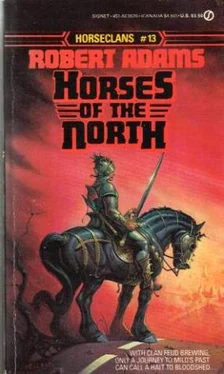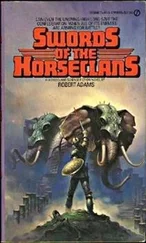Soon after his father’s death, a routine inspection of the bunkers had disclosed that a large number of the infinitely dear percussion caps used to reload the small-arms cartridges had somehow been exposed to long dampness and were mostly unusable. Faced with a vastly straitened supply of ammunition in the foreseeable future, Ian had retired every automatic and allowed only the very cream of sharpshooters to retain their rifles. Now, the bulk of the men of the 228th were armed with and trained in the efficient use of pikes and crossbows, if dismounted, and lances and sabers, if mounted; additionally, those horsemen demonstrating an innate ability were issued and trained to the proper employment of one of those beautiful, far-ranging and very deadly recurved-reflex hornbows fashioned by some folk to the south and traded by the merchant-wagon caravans that occasionally wended their long, arduous and dangerous way up here.
The sabers of the horsemen and the straight-bladed swords of the infantry were not so lovely and well balanced as were the ancient, patrimonial, basket-hilted blades born by officers and warrants, but they were every bit as effective in the hot little actions that resulted on occasion from brushes of patrols, hunting or foraging parties with prairie rovers. To fashion the needed swords, dirks, pike and lance heads and ferrules, helmets and a modest amount of body armor for each man, it had been found necessary to strip off the now-perforce-stationary armored vehicles ail of the protective plates, along with steel tracks, wheels and every other bit of metal that did not have a direct bearing upon the use of the 76mm guns. The useless automatics, too, went to the forges; lacking proper ammunition, there was simply no point in retaining the heavy, unwieldy things, Ian felt.
He had read and reread and committed to memory as much as he could of certain of the ancient books of his great-grandfather’s extensive, well-thumbed library, then he had undertaken the retraining of his command … and barely in time, too.
After being sanguineously repulsed by the fort and the well-defended inner perimeter of the station compounds, a mounted band of some thousand or so prairie rovers began to despoil the lands and pastures round about the station, whereupon Colonel Ian Lindsay marched out his infantry and cavalry to do battle. The pikesquare stood rocksteady under charge after furious charge, while the crossbowmen at the corners and the mounted horse archers massed in the center emptied saddle after rover saddle.
When, finally, the rovers broke and began to stream away from the field of battle, the square opened and the mounted troops poured out to pursue and harry, half of the pikemen trotting in their wake with swords and axes, while the other half went about dispatching wounded foemen on the stricken field before returning to the fort. There had been counted over five hundred bodies of dead rovers, but Ian Lindsay had lost nearly a hundred killed on the field or in the pursuit and half a hundred more who had died since of wounds. He still mourned them all.
At a brief rap upon his door, Colonel Ian Lindsay broke off his rememberings. “Come.”
The man who entered was about Ian’s own age, with close-cropped yellow-gray hair and a red-and-gray mustache plastered to a sweaty face drawn by deep lines of care and worry and discouragement.
As Ian Lindsay was the hereditary colonel of the 228th Provisional Battalion, so was Emmett MacEvedy the hereditary director of the station and therefore in official charge of all nonmilitary personnel. Emmett and Ian had been good friends in childhood, and the two worked closely together at all times, as indeed they must in order to keep their people alive, secure and reasonably well fed in this savage world.
Colonel Lindsay poured an old, chipped mug half full of a straw-pale whiskey and pushed it across the age-darkened desk, waving toward a facing chair. The newcomer sank wearily into the chair, drained off a good half of the whiskey, then simply sat, staring moodily into the mug.
“Well, Emmett?” queried the colonel, after a few moments of unbroken silence. “Say you have some good news for me.”
The man sighed deeply and slowly shook his head, then sighed once again and looked up. “I do have news, Ian, but it’s hardly good. It’s not just the wheat and the barley this year, Godhelp us. The rye is affected, too, and the oats, and even the maize. Not a spear or an ear I examined that doesn’t show signs of the damned blight… and I was through most of the fields. We might get silage out of those fields, but that’ll be about all.”
Knots of muscle moving under his ears as his clenched jaws flexed, the colonel stared at MacEvedy from beneath bushy brows, cracking his big, scarred knuckles one by one. At long last, he spoke.
“Well, we’ll just have to make do with potatoes again, I suppose.”
Once more the director sighed and shook his head. “I’d not count on it, Ian, not even on that. I checked the potatoes, too. The foliage is discolored and stunted, and those tubers that I had pulled up had none of them developed properly … and the beets and turnips seem to be similarly afflicted.”
Through force of habit, the colonel cast a quick glance around the office, then leaned forward, lowering his voice and speaking swiftly.
“Emmett, these last two years have not been at all good—you know it and I know it—and if we lose all of the grains and the potatoes this year, all of us will be in the shit for fair, for there simply are not enough remaining reserve foodstocks to feed everyone—your people and mine own—through to the next harvest. I know this for true fact, Emmett. I personally inventoried the fort stocks and those of the station quite recently.”
“I suppose we’ll just have to send out more hunting parties, Ian, and foragers with wagons, too, you know, for nuts, acorns, wild tubers, potherbs and the like. Hell, the prairie rovers have lived on them for generations—we ought to be able to subsist likewise for a few months, one would think.”
The colonel heard out his friend, then said, “Emmett, we can’t depend on game or on foraged foodstuffs, not unless we are willing to pay the price. That price is high and becoming higher and I, for one, think it’s already too high. My estimate of the situation is that each and every hundredweight of dressed game is costing us one man killed or wounded in brushes with the damned skulking rovers’ hunting parties, with whom ours are competing. If we start vying with them for plant food as well, every wagonload we bring back here is going to be paid for in blood.”
“Well …” The director hesitated, his brows knitted up as he carefully thought of his next words, then he let them go, all in a rushing spate. “If worst comes to worst, Ian, there are cattle and sheep can go to table without trimming the herds too much. And rather than see folk starve, we could eat the shire horses and the riding stock, as well, I suppose.”
The colonel snorted derisively. “And if we slaughter the shire horses, just what, pray tell, Mr. Director, will provide draft for the harrows and plows, come spring, eh?”
MacEvedy squirmed a bit in the chair. “Well … ahh, Ian… ahh, the really ancient peoples used oxen for draft work, you know, back before horses were bred up big enough to be worthwhile, and some of the prairie traders use them to draw wagons, too, you know, you’ve seen them.”
The colonel chuckled. “Yes, I’ve seen them, but they were an entirely different breed from our cattle. I know I’d not care to be the man who took it upon himself to try to hitch Old Thunderer to any plow or wagon.”
“Ian, Ian,” the director remonstrated, a bit wearily, “Old Thunderer is a stud bull, far too old and set in his ways to do more than what he’s always done. But I have quite a number of young steers that would be much more amenable to training for draft purposes. And the traders say that on level ground, a good draft ox can provide a stronger, steadier pull than even the best shire horse or mule.”
Читать дальше












